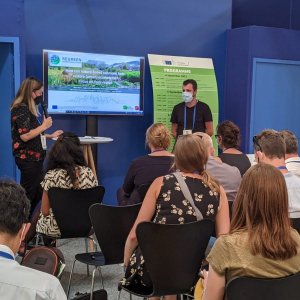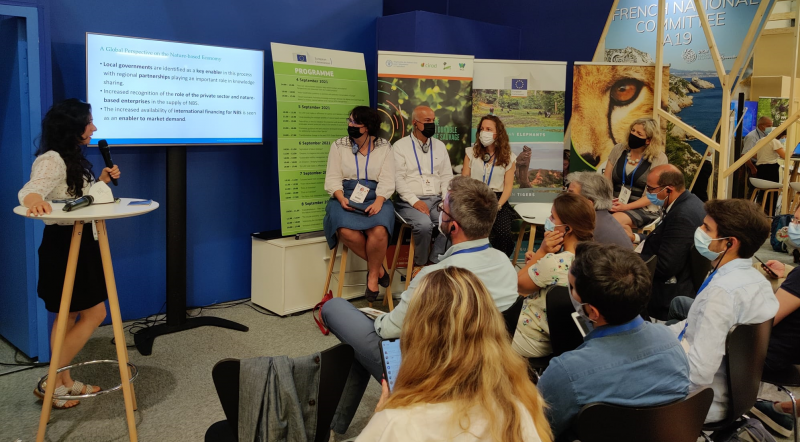
The IUCN World Conservation Congress in September 2021 gathered experts across many fields to discuss the topic both virtually and on site in Marseille. NetworkNature experts took part in hosting and organising sessions to discuss and highlight the role of nature-based solutions (nbS) in ecosystem restoration.
During session ‘Lessons learnt from co-creation of NbS in Living Labs’ the main barriers to spreading NbS were discussed. Many found the willingness of stakeholders lacking, with especially that of rural landowners. Further, to bring decision makers unfamiliar with the terminology on board is a major hurdle. To overcome these barriers different actors need to be involved in a co-creation process involving constant dialogue, consideration for cultural differences and adapting methods to suit different contexts. The EU NbS Task Force 6: Co-creation & Governance session had Israa Mahmoud from Politecnico de Milan, working on CleverCities , Goncalo Canto Moniz, coordinator of Urbinat and Americo Mateus, and Gerd Lupp, from Technical University of Munich working on Phusicos, dscussing upcoming joint guidelines to help improve integration of co-creation of NbS into local governance. Involving stakeholders in NbS planning, design and implementation stages ensures that solutions are tailored to actual needs.
In session ‘From nature-based solutions to a nature-based economy’ the EU NbS Task Force 3 ‘Governance, Business Models and Financial mechanisms‘ presented a draft white paper on the topic. Julie Delcroix, Policy Officer at the EU on biodiversity and nature-based solutions, brought to the fore that EU will prioritise NbS to achieve a sustainable recovery. Currently the EU is looking into how to increase demand for NbS and subsequent supply from both the private- and public sectors. In order to achieve this Edoardo Crocci, a senior researcher in the field from Bocconi University, working on the Urban GreenUP, called for valuation of the benefits nature provides, and to disincentives `free-riding`. He believes the full framework of natural capital accounting should be taken into use, to help us look beyond GDP. The session called for stimulus to increase demand of nature-based enterprises (NBEs) and services, through:
- portfolio approach
- increasing awareness of NbS benefits, especially economic
- sharing best practices
- developing individual market sectors
- stimulate the start-up and growth of NBEs
- developing standards

Photo: Daniela Rizzi presents at IUCN WCC
Daniela Rizzi, Senior Officer in Sustainable Resources and Climate Resilience from ICLEI Europe, working on Connecting Nature, mentioned that local governments are key enablers of market uptake and reminded that regional partnerships play a crucial role in knowledge sharing for the nature-based economy. She called for an international financing scheme for NbS, and mentioned that policy will be crucial to achieve this not only on an EU-level but also through multi-level governance. There is a need for collaboration across sectors that starts with looking at how to build avenues for discussion between different actors.
Further a lively discussion ensued among the audience on how NbS should be integrated in all levels of planning, and how the branding NbS as an ‘asset’ can help get recognition for NbS, and to underline human dependence on nature.
